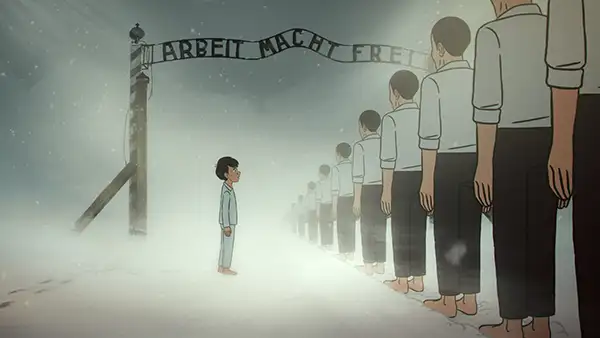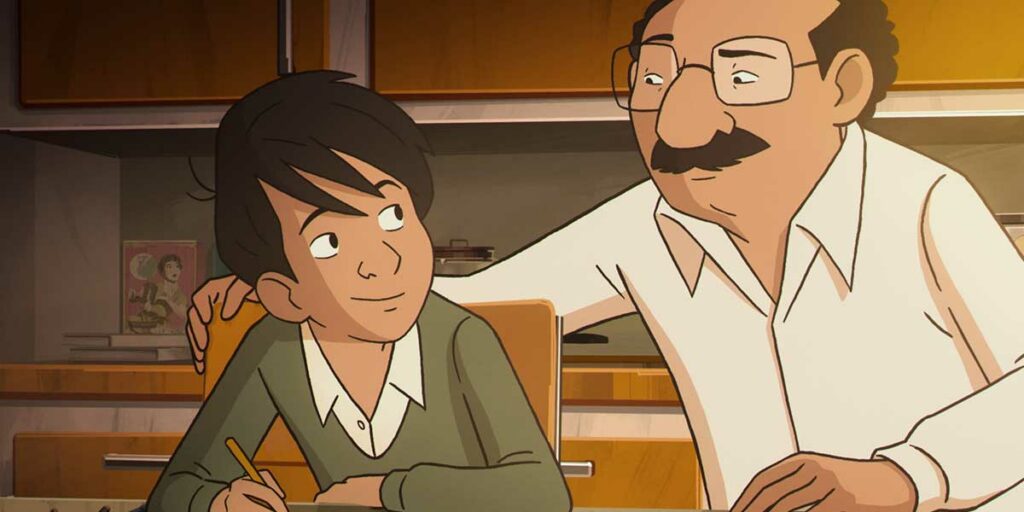My Father’s Secrets portrays a fascinating family story, telling the painful history of the Holocaust through the medium of animation.
During My Father’s Secrets, the main character talks about drawing as “a shared language that didn’t need words,” and this is exactly what this film is. The drawings tell the story of a historical moment we struggle to make sense of and put into words. Parallel to the main plotline, the theme of drawing also constantly comes back during the film as a thread that connects father and son throughout the whole movie. This is particularly relevant and fitting as the film chooses to tell almost the entirety of its story through animation, which is also very fitting as the film is based on an autobiographical graphic novel by Michel Kishka.
Directed by Vera Belmont, My Father’s Secrets starts in 1959 in Belgium where Michel Kichka (Ilan Galkoff) lives with his family. Even many years after the war, Michel’s father Henri (Elliott Gould) avoids talking about the Holocaust at all: his children only know that he was in a camp and that he has a number tattooed on his arm and embark on a journey to discover more about their father’s past throughout the film. It is only after the Eichmann trial in Jerusalem that Henri starts talking about his memories of the war to everyone but his family: he understands the importance of remembrance but can’t bring himself to talk about the trauma of the Holocaust with his loved ones.
My Father’s Secrets underlines the importance of memories and remembrance of an event that had been hidden and silenced for too long, one that even its survivors struggled to come to terms with, as shown in the movie. At the end of the film, Michel says that his father “agreed to tell me his story and asked me to pass it on, which is what I am doing today.” This is ultimately the film’s biggest achievement: immortalizing in the film form the testimony of the Holocaust, which is increasingly important as this generation is most likely the one who will be able to have a direct conversation with Holocaust survivors.
The use of animation is very impressive as it ties back to Michel’s personal story as he now is a professional cartoonist and illustrator, but it also feels like the only way this story could be told. In fact, animation is a clever way of getting around the inherent issues of showing the Holocaust in film form: by using animation to tell its story, My Father’s Secrets is able to portray the unrepresentable trauma of the Holocaust, allowing the film to touch on sensitive topics without visually representing the atrocities of the Holocaust.

But the film is not only animation. In fact, as Michel and his brother learn more about the reality of the camp their father stayed in, we see live-action photos and, later on, footage of the Eichman trial. I liked the use of live-action as it gave even more relevance to these key historical moments that we need to see in live-action form, the film seems to suggest. In this sense, the juxtaposition of animation to tell a personal story and live-action footage to portray historical events used in My Father’s Secrets reminded me a lot of Ari Folman’s Waltz with Bashir: while it may have been used before, it is a very interesting and successful way of using both techniques to narrate this story with historical accuracy.
While the film does focus on memories of the Holocaust, I would have liked to see more of this, especially from a film that focuses so much on remembrance. Of course, much of the film resembles Michel’s own way of perceiving his father’s memories and story and, therefore, often tends to focus on Michel rather than on the historical past the family seems to be haunted by. Halfway through the film, it seems like My Father’s Secrets loses its focus as a lot of its plot starts focusing on each character’s personal life: while some of this is important, there is a set of other plotlines that feel irrelevant and forgettable compared to the rest of the film that focuses on the family tragedies.
The voiceover is a necessary element in this story, as Michel introduces us to the story and quite literally narrates it to the audience as the character grows up during the film, but it does get too explanatory at times. The film falls into the trap of having the narrator explain through a voiceover something that we already see on screen, which ends up being redundant and unnecessary. In this sense, I wish My Father’s Secrets would have relied more on the visual power of its animation alone rather than having to explain everything in words.
Although this may not be true for the original version, I found the dubbing of the English version of My Father’s Secrets to be a little awkward at times. Hearing the dialogue of a film that is mostly set in Belgium performed in perfect English felt a little jarring and drew me out of the story at the beginning as it stands in stark contrast with its setting, even if Gould’s performance as Henri is definitely a heartfelt and powerful one. If possible, I would recommend watching this film – and every other film in a foreign language for that matter – in its original language with subtitles.
While you may not necessarily learn anything new about the Holocaust from this film, it is still a worthwhile and emotional watch, as My Father’s Secrets is a powerful reminder of the importance of memories and the need to remember. Even though animation is not exclusively aimed at children, this film could also provide an introduction to such delicate themes for a younger audience as it treats its subject matter with the sensitivity needed and stays away from visually showing many of the atrocities of the Holocaust.
My Father’s Secrets will have its UK Premiere at the UK Jewish Film Festival on 16 November, 2023 with a Q&A with David Baddiel and director David Freedman. The film will be available to watch on UK & Ireland digital platforms from 27 November.

